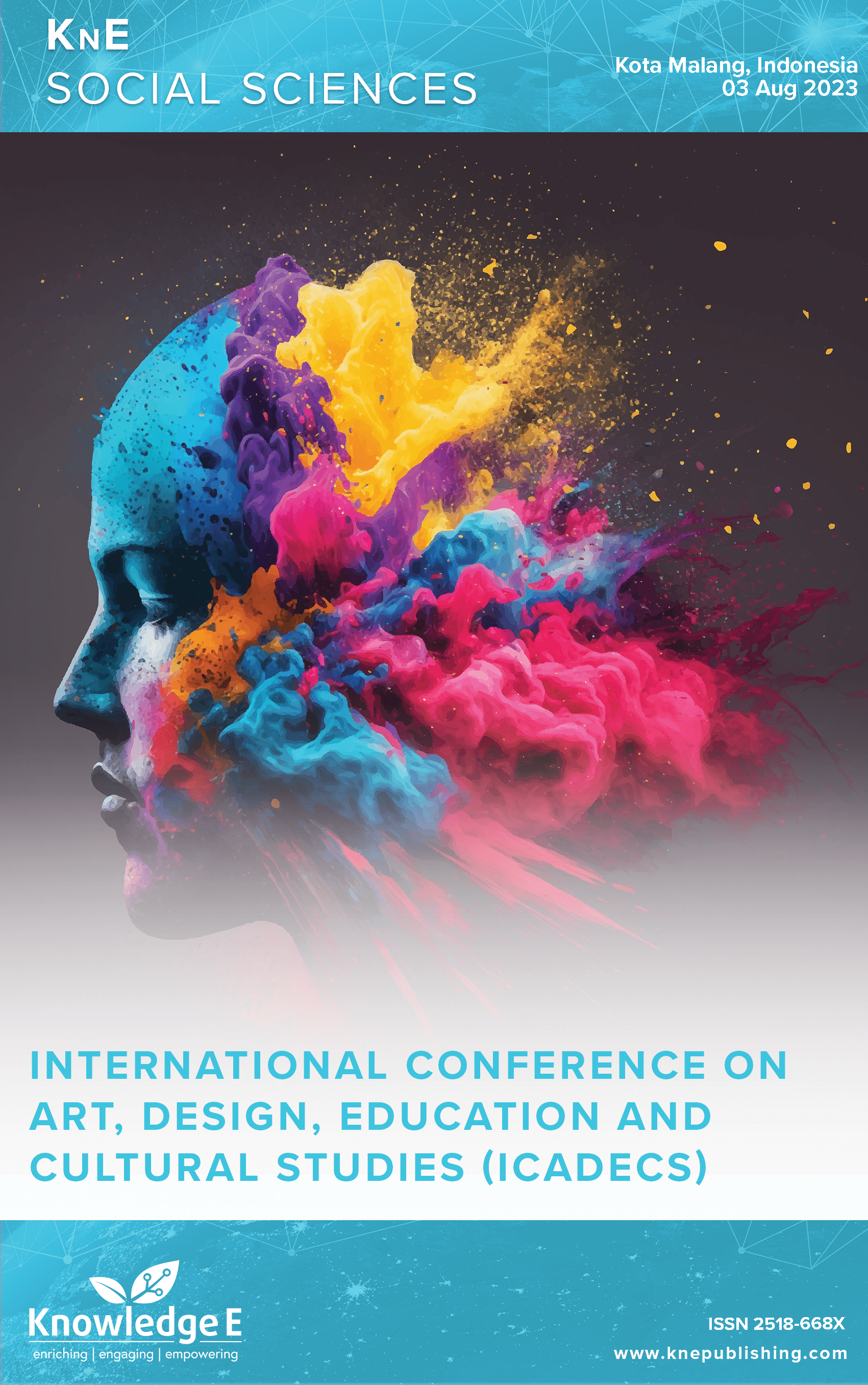Khalid Bin Walid in Javanese Visual
DOI:
https://doi.org/10.18502/kss.v9i15.16199Abstract
This paper aims to discuss the model for the creation of wayang figures depicting Kekayon Khalifah, specifically focusing on Khalid bin Walid, a renowned figure in leading battles. The method employed involves Artistic Research and Practice Based Research in contemporary art. The focus of this discussion lies in the development of practice-based artistic techniques. Furthermore, it explores the realization of these figures on buffalo skin, portraying the character as a respected warlord by his troops and feared by his enemies. Realization of embodiment through decorations and ornaments on beautiful leather crafts. This leathercraft works will produce artifacts in the form of the Khalid bin Walid paraga puppet. The ornaments and decorations in this work are complemented by the calligraphy of the characters’ names. Then an interesting visual is created and can imply a certain message to the audience. Especially when this media is exhibited. Works that can be enjoyed by viewers. So this art can be used as education to the public, both formal and non-formal.
Keywords: wayang kekayon, modern art of decoration and ornamentation, paraga Khalid bin Walid
References
Anggraeni D, Hartati S, Nurani Y. Implementasi metode bercerita dan harga diri dalam meningkatkan kemampuan berbicara anak usia dini. Jurnal Obsesi: Jurnal Pendidikan Anak Usia Dini. 2019;3(2):404–15.
Ras JJ. The social function and cultural significance of the Javanese Wayang Purwa theatre. Indones. Circ. Sch. Orient. Afr. Stud. Newsl. 1982 Nov;10(29):19–32.
Setiawan A. Polemic and Reasons for Reusing Wayang and Gamelan as A Medium for Contemporary Preaching Islam Religion in Central Java, Indonesia. Harmon. J. Arts Res. Educ. 2022 Dec;22(2):2.
Lutfianto and F. Lukman. “Religious Message Abdullah Bin Umar Paraga In The Wayang Kekayon Khalifah,” Al-Mada J. Agama Sos. Dan Budaya. 2023;6(1):1.
Haris A. “Innovation and Tradition in Islam: A Study on Bid’ah as an Interpretation of the Religion in the Indonesian Experience,” Doctoral Thesis, Temple University, USA, 1998.
R. binti Arifin, “Elements of Bid’ah and Khurafat in Wayang Kulit: A Case Study in Kota Bharu Kelantan,” Thesis, Kolej Universiti Islam Malaysia, Kuala Lumpur, 2004. Accessed: Jan. 08, 2023. [Online]. Available: http://ddms.usim.edu.my:80/jspui/handle/123456789/7183
Putri VA, Zafi AA. “Membongkar Hukum Akulturasi Budaya Sunan Kalijaga,” Tsaqofah Dan Tarikh J. Kebud. Dan Sej. Islam. 2022 Feb;6(2):2.
Thai Theatre and the Interplay of Perfection and Imperfection. Routledge; 2022. pp. 116–30.
Johnson IC, Lim D. Curating Shadows: Malayan Shadow Puppets in Singapore’s Asian Civilisations Museum. J Malays Branch R Asiat Soc. 2022;95(1):51–88.
O’Connor P. Insights in Applied Theatre: The Early Days and Onwards. Intellect Books; 2022.
Bazheir NA. The Stages of the Play’s Development from Ancient Arab Times. J Posit Sch Psychol. 2022 Nov;6(10):10.
Bazheir NA. Arab Theatre and Plays: Developmental Stages and Challenges. ARTSEDUCA. 2023;(34):34.
Kieven L. ‘The wandering poet’; Depictions on ancient Javanese relief panels. Wacana J. Humanit. Indones. 2022 Dec;23(2):288.
Fawaid A, Udasmoro W, Margana S. “Islam Behind the Court Wall: Politics and Aesthetics of Javanese Islam in Babad Tanah Jawi,” presented at the International Symposium on Religious Literature and Heritage (ISLAGE 2021), Atlantis Press, Feb. 2022, pp. 76–84.
Hannula M, Suoranta J, Vadén T. Artistic Research: Theories, Methods and Practices. Helsinki: Academy of Fine Arts University of Gothenburg; 2005.
Puri LA, Kartika DS. “Reinterpretation of Wayang on Indonesian Contemporary Art: Case Studies ‘Heri Dono dan Indieguerillas,”’ Int. Interdiscip. Conf. Arts Creat. Stud., vol. 4, no. 1, pp. 29–45, Dec. 2022.
Syafril EP, Agel NA. Wayang Sada (Sodo): A Media of Indonesian Language Learning and Cultural Introduction for Foreign Learners. Lond. J. Soc. Sci. 2022 Oct;2(4):4.
J. ad-D. ‘Abd al-Rahmān as-Suyūtī, Tārīkh al-Khulafā. Beirut, Lebanon: Dar Ibn Hazm; 2003.
Ayoub MM. The Crisis of Muslim History: Religion and Politics in Early Islam. Oxford: Oneworld Publications; 2003.
Bayat A. Piety, Privilege and Egyptian Youth. ISIM Newsl. 2002;10(1):23–23.
Bayat A. “6. The Politics of Fun,” in 6. The Politics of Fun. Stanford University Press; 2013. pp. 129–50.
Reid-Searl K, Quinney L, Dwyer T, Vieth L, Nancarrow L, Walker B. Puppets in an acute paediatric unit: nurse’s experiences. Collegian. 2017;24(5):441–7.

